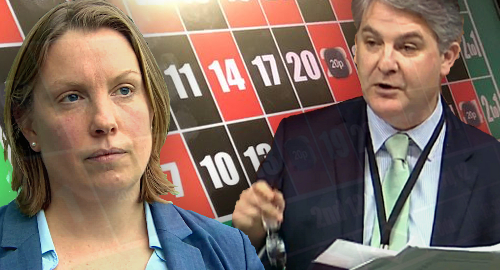 The UK government is reportedly considering procedural moves to ensure its fixed-odds betting terminals (FOBT) stake cut proceeds according to plan.
The UK government is reportedly considering procedural moves to ensure its fixed-odds betting terminals (FOBT) stake cut proceeds according to plan.
On Monday, Bloomberg quoted anonymous sources who claimed the Tory government would implement the Autumn Budget 2018 using a statutory instrument, which would prevent parliamentary opponents from introducing budget amendments to achieve a swifter timeline for cuts to the maximum stake on FOBTs.
Last week, Chancellor Philip Hammond released his budget, which called for the FOBT stake cut from its current £100 to £2 by October 2019. Sports Minister Tracey Crouch, who expected the cut to be imposed in April 2019, submitted her resignation a few days later to register her displeasure.
Hammond attempted to strike a philosophical stance in employing parliamentary trickery to pass the budget, arguing that, while it was the government’s job to propose budgets to parliament, “it’s not our constitutional tradition that parliament line-by-line amends the budget.”
Hammond also rejected notions that he was protecting betting operators, saying he viewed FOBTs as “terrible things.” But Hammond noted that the stake cut will result in the loss of “many thousands” of jobs as operators close less profitable betting shops. As such, the government needs to ensure that “as many as possible of these job losses are dealt with through voluntary redundancy processes rather than compulsory redundancy processes.”
A glance at any bookmaker’s quarterly earnings report show FOBTs routinely accounting for over 50% of retail betting revenue. UK gambling operators with a significant high street presence are bracing for a major financial hit when the stake cut takes effect.
Over the weekend, Crouch (pictured left) added more specifics to her resignation letter’s claim that the perceived delay was “due to commitments made by others to those with registered interests.” Speaking to the BBC, Crouch confirmed media speculation that she was referring to Tory MP Philip Davies, whose ties to the betting industry have made him a whipping boy for the UK’s anti-gambling media.
Crouch noted that Davies (pictured right), who chairs the Parliamentary All Party Betting and Gaming Group, had met with Digital, Culture, Media and Sports Secretary Jeremy Wright before the budget’s public debut. Crouch added that Davies was “very vocal in parliament on behalf of the betting industry,” while lamenting the perception that “clearly I wasn’t as persuasive as some of my other colleagues.”
Davies admits meeting with Wright, who Davies claims was “minded to introduce the reduction” in 2019. But Davies “pointed out” that “the decision had already been taken to implement this decision in 2020.”
Wright has denied that the October 2019 implementation represents a delay, noting that the original plan was for the change to take effect in April 2020. Wright said language on this issue had been “twisted to various uses” and suggesting there’d actually been a delay “is a going a little far.”